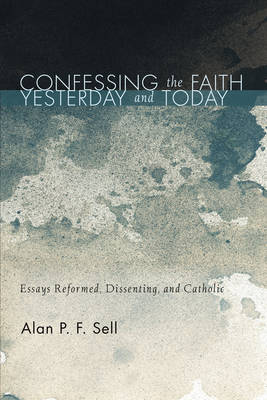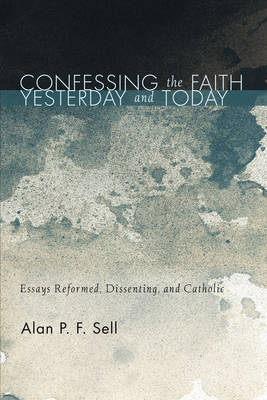
- Afhalen na 1 uur in een winkel met voorraad
- Gratis thuislevering in België vanaf € 30
- Ruim aanbod met 7 miljoen producten
- Afhalen na 1 uur in een winkel met voorraad
- Gratis thuislevering in België vanaf € 30
- Ruim aanbod met 7 miljoen producten
Zoeken
Confessing the Faith Yesterday and Today
Essays Reformed, Dissenting, and Catholic
Alan P F Sell
Paperback | Engels
€ 55,95
+ 111 punten
Uitvoering
Omschrijving
What is it to confess the Christian faith, and what is the status of formal confessions of faith? How far does the context inform the content of the confession? These questions are addressed in Part One, with reference to the Reformed tradition in general, and to its English and Welsh Dissenting strand in particular. In an adverse political context the Dissenters' plea for toleration under the law was eventually granted. The question of tolerance remains alive in our very different context, and in addition we face the challenge of confessing and commending the faith in an intellectual environment in which many question Christianity's relevance and rebut traditional defenses of it. In Part Two it is recognized that Christian confessing is an ecclesial, not simply an individual, calling, and that the one confessing church catholic is visibly divided over doctrine and practice. Suggestions for ameliorating this situation are offered, though the final resolution may be a matter for the eschaton. Until then Christians are called to witness faithfully and to live hopefully as citizens of heaven. In an epilogue the challenges and pitfalls of systematic theology as a discipline involving both confession and commendation are explored.
Specificaties
Betrokkenen
- Auteur(s):
- Uitgeverij:
Inhoud
- Aantal bladzijden:
- 318
- Taal:
- Engels
Eigenschappen
- Productcode (EAN):
- 9781620325940
- Verschijningsdatum:
- 26/02/2013
- Uitvoering:
- Paperback
- Formaat:
- Trade paperback (VS)
- Afmetingen:
- 152 mm x 226 mm
- Gewicht:
- 453 g

Alleen bij Standaard Boekhandel
+ 111 punten op je klantenkaart van Standaard Boekhandel
Beoordelingen
We publiceren alleen reviews die voldoen aan de voorwaarden voor reviews. Bekijk onze voorwaarden voor reviews.








